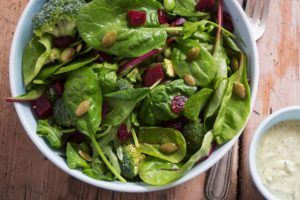 Two of the most significant drawbacks to aging are joint pain and low energy. Experiencing one—or both—of these symptoms can severely limit mobility and cut deep into your quality of life. And now it appears that vitamin K might play a more significant role in your mobility and overall aging than you might have thought.
Two of the most significant drawbacks to aging are joint pain and low energy. Experiencing one—or both—of these symptoms can severely limit mobility and cut deep into your quality of life. And now it appears that vitamin K might play a more significant role in your mobility and overall aging than you might have thought.
A new study conducted by researchers at the Jean Mayer USDA Human Nutrition Research Center on Aging at Tufts University found that low blood levels of vitamin K were linked to an increased risk for mobility limitations and disability in older adults.
Advertisement
Vitamin K is a blanket term used to define a group of fat-soluble vitamins that play a role in blood clotting, bone metabolism, and regulating calcium levels in the blood. Previous research has linked low vitamin K to higher risks of joint pain and slower gait speed.
Getting enough vitamin K, therefore, may reduce the likelihood of joint pain and boost energy and mobility.
For their analysis, researchers looked at circulating vitamin K blood levels in 635 men and 688 women aged 70-79. Mobility was assessed every six months for six to ten years through phone interviews or clinic visits. “Mobility limitations” was defined as having any amount of difficulty either walking for a quarter mile or being unable to climb ten steps without resting. “Mobility disability” was defined as having a lot of difficulty or inability to walk or climb the same distance.
Participants with low levels of circulating vitamin K were 1.5 times more likely to develop mobility limitations and nearly twice as likely to develop mobility disability than people with sufficient blood levels.
Because of vitamin K’s role in bone metabolism and calcium levels, it stands to reason that too little of it can lead to sore, weak bones, and painful joints. Fortunately, vitamin K is available in a variety of foods and is relatively easy to include in your diet. Adequate intake for vitamin K is 90 micrograms (mcg) per day for women and 120 mcg per day for men. Some of the best sources include:
- Raw spinach (1 cup is 145 mcg)
- Raw kale (1 cup is 113 mcg)
- Collard greens (1/2 cup boiled is 530 mcg)
- Chopped steamed broccoli (1/2 cup is 110 mcg)
Because vitamin K is a fat-soluble vitamin, supplementation is not recommended unless instructed by your doctor. Vitamin K could be another important tool to help you age gracefully and promote independence.
